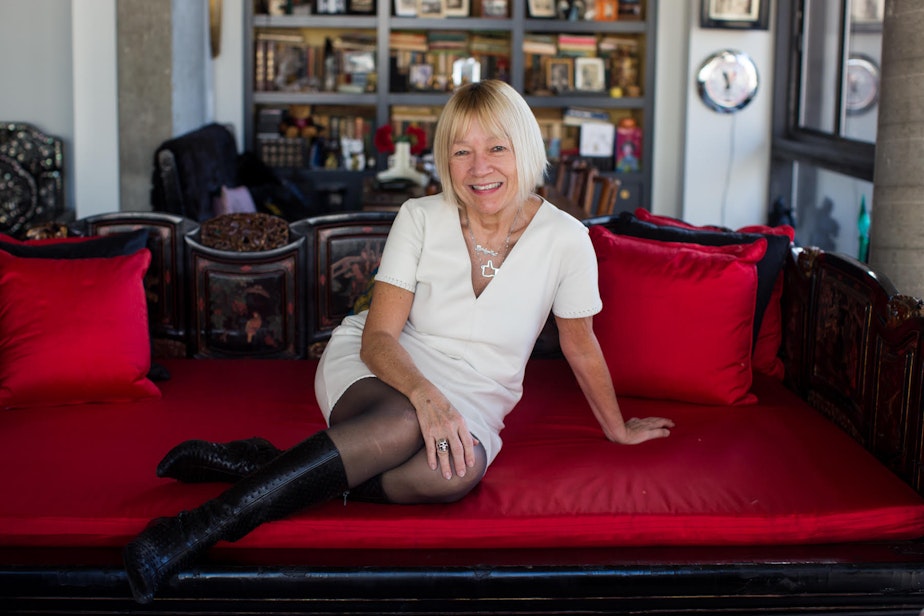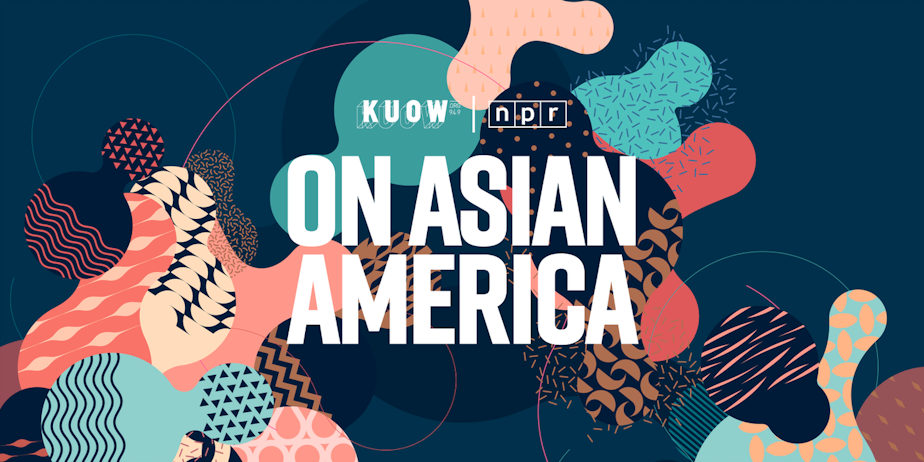'Shame changer': Sex tech CEO disrupts Asian stereotypes with adult films

Make Love Not Porn founder Cindy Gallop says the future of pornography is "social sex" and the end of fetishizing women of color.
Although attitudes are shifting, pornography has long been seen as objectifying at best, and encouraging violence against women at worst — especially women of color.
That may be one reason why half-Chinese sex tech entrepreneur Cindy Gallop insists that her startup, Make Love Not Porn, does not function like an internet pornography website. Instead, she compares the adult online community she leads to Facebook, except that instead of birthday wishes and pet portraits, users share videos of themselves having sex.
Her business is "pro-sex, pro-porn, pro-knowing the difference," she says, adding that what she hopes to be doing is pioneering a new category of social sex where content creators feel empowered, not reduced to stereotypes.
I talked with Gallop about the adult film industry and its influence on Asian female representation. Our conversation occurred at the height of the recent spike in hate crimes targeting Asians in America, shortly after after the mass shooting in Atlanta where a gunman rampaged through three spas. He killed eight people, including six Asian women. Authorities reported that the murders were fueled by the shooter's sex addiction.
In response, mainstream and social media feeds lit up with calls to #StopAAPIHate, and conversation surged around Asian and Pacific Islander representation.
Sponsored
Gallop said if some, or even most of that response is simply performative, she doesn't care. "We should absolutely seize this environment to make the things that we want to happen, happen," she said, adding that she doesn't care what the motivation is as long as the discourse leads to change.
The transcript below has been lightly edited for clarity.
Please note: This episode contains unedited language of an adult nature.

GALLOP: Nobody looks at an Asian woman and goes, there's a bloody brilliant business brain in there.
Sponsored
LEONG: That's Cindy Gallop, advertising Woman of the Year and CEO. She calls herself the "Michael Bay of business," a nod to the big-budget filmmaker known for graphic, stylized explosions because, she says, she likes to blow shit up. She did exactly that on stage at TED in 2009. Here are her opening remarks.
GALLOP TED Talk clip: I date younger men, predominately men in their 20s. And when I date younger men, I have sex with younger men. And when I have sex with younger men, I encounter very directly and personally, the real ramifications of the creeping ubiquity of hardcore pornography in our culture.
LEONG: Gallop's TED Talk was not only provocative for what she said, but also for who was saying it. Gallop is a half-Chinese woman, now in her 60s.
GALLOP: There is absolutely the stereotype that Asian women are sweet, smiling, submissive, feminine. You know, all of which is saying, you know, they are everything that the patriarchy would like them to be.
LEONG: Gallop's TED Talk was not just about subverting expectations on stage and in her dating life as an older Asian woman. It was also a rally call to transform the internet, one adult video at a time.
Sponsored
Gallop's talk served as the launch of her website that's aiming to do exactly that. It's called Make Love Not Porn.
The site is like Facebook, but instead of sharing puppy pictures and birthday wishes, users share videos of themselves having sex. Members pay to watch the videos and half of that fee goes directly to the adult filmmakers.
Every featured video must be approved by a curator, who's an actual person; not an algorithm. According to one curator for the site, the videos that get accepted are those that show consensual real world sex without performance. Viewers can leave comments on the films and interact directly with the people featured in them.
GALLOP: Right, so first of all, this is very important. Make Love Not Porn is not porn. Okay? We are pioneering a whole new category of social sex. Like I said, we are pro-sex, pro-porn, pro-knowing the difference.
LEONG: In our conversation, Gallop repeatedly underscored that her site is not a porn site. Emphasizing this distinction makes sense for a brand led by a woman known as a champion of female empowerment.
Sponsored
Although attitudes may be shifting, pornography has long been seen as objectifying at best, and encouraging violence against women at worst — especially women of color.
So, considering the moment we're in, I couldn't help but wonder, are Gallop's real world sex videos really making a difference?
There was one question I just had to ask.
LEONG, on tape: What would you say to public radio listeners who are listening to this and thinking to themselves, we are in the midst of a civil rights reckoning like we have not seen in our lifetime. There is a call for change right now that is urgent in a very new way, and they are listening to this and saying, 'Why does porn matter in this conversation?'
GALLOP: I'll tell you why what we're doing at Make Love Not Porn matters. First of all, Make Love Not Porn is a place where you will find nothing but love. We celebrate nothing but love. We showcase nothing but love.
Sponsored
Who we are sexually forms everything about how we feel about ourselves, our relationships, other people, our lives, our very happiness.
Everybody deserves to have all of that shame and guilt taken away. You know, I talk about Make Love Not Porn as a "shame changer." You know, that's what we are. And to be a whole person, and especially be able to relish that when society is putting all of us in boxes often based on our sexuality as much as our race, ethnicity, or anything else.
LEONG: So in other words, Gallop might be taking a provocative approach, but her message is a familiar one. We have to first accept ourselves if we want to be better at accepting other people.
In 2017, Canada's McGill University also thought there were larger lessons to be learned by taking a closer look at pornography. In a study that examined nearly 200 pornographic videos, McGill found that compared to videos featuring Black and white women, films featuring Latina and Asian women were more likely to depict aggression.
The study also posited that in contrast to mainstream film and television, the adult film industry is one of the few places in the media where Asian and Latina women have higher visibility. Because of that increased presence, the study pointed to the possible importance of the porn industry in perpetuating, but also reshaping, stereotypes of these women.
When I asked Gallop what Make Love Not Porn is doing differently in terms of representation, she said there's no fetishizing of Asian women or any other women of color on her website. She also added that the Asian women who do share videos often express that they feel liberated by the site's framework. The evidence, Gallop says, is in the comment section.
GALLOP: It says much, to be honest, Kristin, about what people do not say on Make Love Not Porn, as what they do say. You know, I'm thinking specifically about one of our Asian Make Love Not Porn stars, Yin Yang Tao, who is very popular. There are always wonderful comments on her videos and the comments are just about how wonderful she is. And, you know, it's about the fact that there is nothing related to race in any of that.
LEONG: In fact, Gallop claims that her site rarely, if ever, receives racist comments from members. She points to this as evidence that her site has the potential to shift the way Western viewers see Asian women.
And in the meantime, she says, the way Asian women see themselves is already changing. She says even in Japan, there's a feminist movement building there, even if people might not be ready to call it that.
GALLOP: Japan is quite frankly, in my view, the most sexist Asian country. Okay, I mean, they're all sexist, but Japan goes to whole new depths of sexism.
And so, on every one of my trips there over the years, I've increasingly found in my conversations with Japanese women that they are less and less willing to stay in the place that society puts them in. And you know, whether or not they call it this, feminism is absolutely taking hold in Japan. And women are not prepared to live the way they had it before.
LEONG: Like these Japanese women Gallop describes, people all over the world these days seem less and less willing to accept the status quo. And it's not just fair treatment and better opportunities that historically marginalized communities are calling for, but safety and security too.
In 2020, the Black Lives Matter movement showed the world that protesting and organizing can lead to real transformation. Currently, we are in the midst of a surge in awareness about the reality of anti-Asian racism in the United States like we have never seen before.
For members and allies of our Asian communities, there's a sense of the time for action has finally come. Gallop says the social media activism we're seeing now is a mix of sincerity and performative empathy. But that's okay, she says, it all helps the cause.
GALLOP: As always, there is a wave of caring, there is also a wave of gotta be seen to be caring. And quite frankly, Kristin, that's fine. Because I always go, I don't care what the motivation is as long as you help.
So basically, you know, we should absolutely seize this environment to make the things that we want to happen happen.
LEONG: That's Cindy Gallop, founder and CEO of Make Love Not Porn. You can see photos of Cindy and find a link to her site at KUOW.org /engage. In Seattle, for KUOW Public Radio, I'm Kristin Leong.

This story was produced by Kristin Leong, with audio editing support from Jim Gates.
This story was part of our On Asian America project, a collaboration between KUOW Public Radio, Humanities Washington, Spokane Public Radio, and Northwest Public Broadcasting. The goal of the series is to amplify Asian voices and spark an ongoing dialogue about the experiences and contributions of Asian communities in our state and country. You can find the full 60-minute Speakers Forum On Asian America episode that featured this story here: On Asian America: Sex, gender and the 'exotic other'.
Note from the producer: Identity is a complex topic, and I welcome your feedback. You can email me at kleong@kuow.org and find me on Twitter @kristinleong. I also welcome your ideas for stories from our Asian communities that KUOW should look into next. Reach out. We're listening.
You can also submit feedback and questions about this episode by emailing engage@kuow.org, leaving a voicemail at 206-221-1926, or texting the word “feedback” to 206-926-9955 to send a text.




